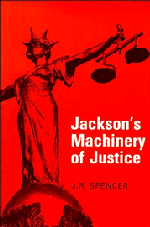Book contents
- Frontmatter
- Contents
- Acknowledgements
- List of figures
- List of tables
- Preface
- Preface to the first edition of ‘The Machinery of Justice in England’
- Abbreviations
- I Historical introduction
- II Civil jurisdiction
- 4 Civil law and criminal law
- 5 County courts
- 6 The High Court
- 7 The mode of trial
- 8 Complaints about the civil courts
- 9 The enforcement of judgments and orders
- 10 The Civil Division of the Court of Appeal and the House of Lords
- 11 The Judicial Committee of the Privy Council
- 12 Arbitration
- III Tribunals
- IV Criminal jurisdiction
- V The personnel of the law
- VI The European dimension
- VII The cost of the law
- VIII Law Reform
- Appendix A The Report of the Civil Justice Review
- Table of Cases cited
- Table of Statutes cited
- Table of Stationery Office publications cited
- Index
12 - Arbitration
Published online by Cambridge University Press: 10 January 2011
- Frontmatter
- Contents
- Acknowledgements
- List of figures
- List of tables
- Preface
- Preface to the first edition of ‘The Machinery of Justice in England’
- Abbreviations
- I Historical introduction
- II Civil jurisdiction
- 4 Civil law and criminal law
- 5 County courts
- 6 The High Court
- 7 The mode of trial
- 8 Complaints about the civil courts
- 9 The enforcement of judgments and orders
- 10 The Civil Division of the Court of Appeal and the House of Lords
- 11 The Judicial Committee of the Privy Council
- 12 Arbitration
- III Tribunals
- IV Criminal jurisdiction
- V The personnel of the law
- VI The European dimension
- VII The cost of the law
- VIII Law Reform
- Appendix A The Report of the Civil Justice Review
- Table of Cases cited
- Table of Statutes cited
- Table of Stationery Office publications cited
- Index
Summary
To most laymen, arbitration suggests referring a dispute to a third party to apply palm-tree justice instead of the law of the land. To a lawyer, however, it means referring a case to a person to decide according to law, but untrammelled by the normal rules of court etiquette and legal procedure. Sometimes a law-suit begun in the usual way is referred to a judge or other court official to hear informally as an arbitrator. As we have seen, this is extensively done with small claims in the county court, and the High Court does something similar with its Official Referees' business; it is also possible for a judge of the Commercial Court to sit as an arbitrator. Generally, however, ‘arbitration’ means a voluntary submission by the parties of their dispute to the judgment of some person who is neither a judge nor an officer of any court. The agreement to arbitrate is generally made in writing, and it may be made either after the dispute has arisen, or in anticipation of any disputes that may arise. Clauses providing for arbitration are common in many commercial contracts and in insurance policies. The agreement, known as the ‘submission to arbitration’, will normally name the arbitrator or provide for some method of appointing him.
- Type
- Chapter
- Information
- Jackson's Machinery of Justice , pp. 101 - 104Publisher: Cambridge University PressPrint publication year: 1989

